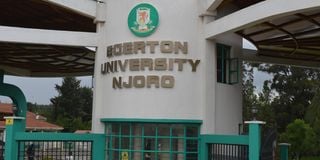Sinking ship? The puzzle of a broke but rich Egerton University

The main entrance of Egerton University, Njoro Campus in Nakuru County.
What you need to know:
- The institution is heavily in debt and unable to meet most of its financial obligations.
- The Njoro-based institution is going through its arguably worst financial crisis in decades.
The deepening financial crisis at the troubled Egerton University has puzzled many stakeholders.
The institution is heavily in debt and unable to meet most of its financial obligations, including paying staff salaries in full.
The Njoro-based institution is going through its arguably worst financial crisis in decades, which has seen its debt rise to Sh6billion.
The institution’s financial situation is so bad, that lecturers’ salaries were abruptly slashed by 40 per cent in 2020, triggering a strike that saw more than 500 dons down their tools, culminating in the closure of the university on November 26 last year.
The management called back the more than 18,000 students on February 12, but with no learning taking place, learners are staring at another wasted semester.
“We’re not going to resume work until our grievances are addressed accordingly and a watertight return-to-work formula is signed,” said Uasu Egerton Chapter secretary-general, Grace Kibue.
The 83-year-old institution that was founded as a farm school in 1939 by Lord Maurice Egerton of Tatton, a British settler, is one of the richest public universities in Kenya going by its asset base.
Despite owning property and resources such as land worth more than Sh2billion in Nakuru, Lamu, Baringo and Nairobi counties, the university has been permanently clutching a beggar’s bowl, in the process greatly denting its brand.
The university owns Egerton University Investment Company which comprises three units: the Agricultural Resource Centre (ARC), a hotel at the main campus in Njoro, Ngongogeri Farm and Lord Egerton Castle and Estate.
The entity is reeling under a massive debt of more than Sh200 million.
Obsolete technology
“We’re planning to utilise more than 2,000 acres of Ngongongeri Farm to plant crops like maize, pasture, barley, wheat, beans and start horticultural ventures, while at the ARC, we plan to popularise our coffee shop and reintroduce bread and other baking products. We also intend to market the castle to get more clients,” said Prof Robert Gesimba, the managing director of the company.
Egerton’s once popular brand of yoghurt is not even visible at the bustling shopping centre opposite the main campus gate or in Njoro Town, four kilometres away.
Interestingly, shops located just outside the university’s gate that would sell the yoghurt and other products produced by the university have remained shut since 2019. The construction of the gate was mired in controversy as it was said to have cost Sh70million.
A don at the Njoro campus told Higher Education that use of obsolete technology was a big concern.
“Egerton has been making yoghurt using a pilot plant that was donated by a Good Samaritan in the early 1960s whose technology is obsolete,” he said.
Professor Paul Kiprotich Kimurto, who is the director of Marketing and Resource Mobilisation, said the closure of the university has impacted negatively on its affairs.
“We have identified all our global alumni to help us reclaim our lost glory. We plan a big funds-drive, but lack of a budget to achieve this goal is still a challenge,” he said.
The permanent secretary for University Education and Research, Simon Nabukwesi, has warned that the financial mess in many public universities will scare away international donors like the World Bank.
Multi-billion projects at Egerton like the “Transforming African Agricultural Universities to meaningfully contribute to Africa’s Growth and Development (TAGDev)”, which is funded by Master Card and Centre of Excellence in Sustainable Agriculture and Agribusiness Management (CESSAM), funded by World Bank, are at stake if the strike persists.
Declining revenue stream
Insiders say that the problem with Egerton is that it has failed to exploit its resources and income-generating units as well as lack of teamwork and able leadership.
Many are of the opinion that the Centre of Excellence for Livestock Innovations and Business (CoELIB) could save the institution from sinking in debt through innovation, research and technology, but this can only happen if the team steering this ship would be accorded required support.
CoELIB is establishing a research grant to raise the funds necessary for supporting research projects by Egerton University researchers and scientists in priority research areas.
The vice chancellor, Prof Isaac Kibwage, who was appointed in October last year, blames the situation on insufficient resources from the government.
“What is ailing the university is the declining revenue stream, which is almost coming to zero, after the university stopped admitting self-sponsored students in 2017,” said the VC.
He pointed out that the capitation from the government has been reduced by 30 percent. Egerton needs an additional Sh1.3 billion in the current financial year to stay afloat.
“We have large idle land at the coast and in Njoro. I have formed a committee to find the best way to use the resources to increase our revenue streams, besides looking into ways to attract more research funds to sustain the university,” said Prof Kibwage.
The Auditor-General’s report and financial statements on Egerton University for the year ended June 30, 2020, exposed an institution that routinely flouts regulations.
According to the report, Egerton failed to disclose critical financial statements, financial information and business activities of the university, casting doubt on the integrity of its internal controls and ability to safeguard against the loss of revenue.
“The university is becoming more dependent on external funding, which is not very desirable,” said the Auditor General, Nancy Gathungu, in her report.





